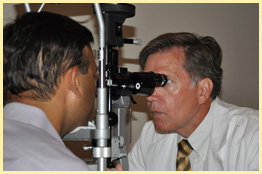Wilmington Cataract Surgery – Delaware Cataract Care
A cataract is a clouding of the eye’s natural crystalline lens, the part of the eye responsible for focusing light and producing sharp vision. The crystalline lens lies in a sealed bag, or capsule, within the eye and is made up of water and protein. When protein cells clump together, the end result is a cataract.
Cataracts may be caused by a range of medical conditions, long-term sun exposure, certain medications, heredity and eye injury. However, for most people, cataracts are a result of aging and generally affect both eyes.
Symptoms Associated with Cataracts

The most common symptoms experienced by our Wilmington cataract patients include:
- Blurry vision
- Double vision
- Dull colors
- Poor night vision
- Sensitivity to light and/or “halo” effect
- Glare
Initially, improvement in vision can be achieved with a change in corrective eyewear. However, as the condition progresses, cataract surgery becomes the only effective treatment option.
Dr. S. Gregory Smith is a leading Delaware cataract surgeon who has been performing the procedure since 1983. In fact, he frequently trains other eye surgeons both nationally and internationally on the latest cataract surgery techniques. Most recently, Dr. Smith has acquired the revolutionary LenSx laser, which is used to perform several critical steps of cataract surgery. Please visit the respective page for more information on this groundbreaking cataract procedure.
Cataract Surgery in Wilmington, DE
Cataract surgery is the removal of the eye’s natural lens, which is replaced with an artificial lens implant for clear postoperative vision.
Dr. Smith performs cataract surgery using the latest self-sealing, micro-incision technique and premium intraocular lens implants (IOLs). IOLs are artificial lenses that are placed in the eye for clear postoperative vision. Standard IOLs correct distance vision, while multifocal lenses provide clear vision at multiple distances.
Cataract surgery is performed at our outpatient surgical center under a short acting anesthesia that lasts less than 30 minutes. Anesthetic eye drops are administered for maximum patient comfort. The procedure begins with the creation of a tiny, self-sealing incision in the eye, through which the cataract is extracted. In order to remove the lens, Dr. Smith uses the advanced phacoemulsification technique, which involves the use of a surgical probe that emits ultrasonic waves to soften and break up the crystalline lens. Once this is accomplished, the lens is suctioned out of the eye in small pieces. An IOL that is a specific power determined from the measurements of your eye is then placed through the same self-sealing incision.
Delaware Eye Surgeons offers a wide range of premium IOLs for excellent postoperative vision at multiple distances.
For more information on your implant options, please visit our premium IOLs page.
Cataract Surgery Results and Recovery
Following cataract surgery, patients are asked to wear a protective eye shield for up to 24 hours and apply medicated eye drops. Although our cataract surgery patients are able to return home the day of the procedure, they are advised to get plenty of rest and avoid any strenuous activities for a few days. Most of our cataracts patients begin to experience improved vision with almost no discomfort within 24 to 48 hours after cataract surgery.
At Delaware Eye Surgeons, cataract surgery patients are provided with several follow-up appointments to ensure a safe and complication-free healing process. The success rate of cataract surgery performed by our skilled eye surgeon is 98 percent. In addition, most of our cataract surgery patients who receive a premium IOLs reduce or eliminate the need for corrective eyewear.
Cataract Surgery Candidacy
Most patients who suffer from cataracts are excellent candidates for the procedure. However, cataracts do not need to be removed until they significantly impact the patient’s vision and a change in glasses prescription is no longer working. Some cataracts never become severe enough to require surgical intervention. Our doctors can determine when a patient is ready for cataract surgery in Delaware.
Please contact our practice at (302) 993-1300 to schedule your cataract surgery consultation or use our online appointment request form. Prospective Delaware eye patients are also encouraged to use the appointment form to schedule a consultation. Dr. Smith also offers additional surgical procedures, including corneal transplant surgery and glaucoma surgery in Wilmington.

